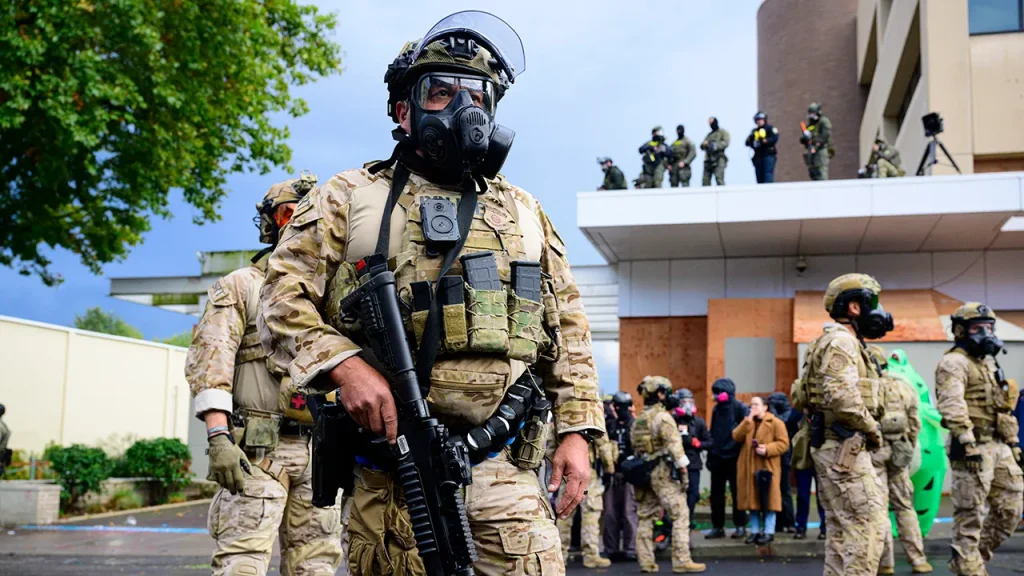Judge Blocks Trump Administration’s National Guard Deployment to Portland
In a significant ruling on Sunday, U.S. District Court Judge Karin Immergut extended a temporary order preventing the Trump administration from deploying National Guard troops to Portland, Oregon. After an intensive three-day trial reviewing more than 750 exhibits, Judge Immergut determined that the government failed to provide adequate justification for the military deployment. The preliminary injunction specifically blocks Defense Secretary Hegseth from implementing memorandums that would have authorized the federalization and deployment of National Guard members from Oregon, Texas, and California into Portland. This injunction will remain in effect until November 7, 2025, when the court plans to issue its final decision on the case.
At the heart of Judge Immergut’s decision was her finding that there was “no credible evidence” supporting the administration’s claims about protest conditions in Portland. According to the judge, testimony revealed that during the approximately two months before the President’s federalization order, protests had not “grown out of control” and involved only “isolated and sporadic instances of violent conduct” that resulted in no serious injuries to federal personnel. This assessment directly contradicted the administration’s portrayal of the situation as one requiring military intervention. The judge placed particular weight on testimony from Portland Police Bureau command staff, noting their firsthand knowledge of the demonstrations and crowds outside the Immigration and Customs Enforcement (ICE) building from June to the present.
The court’s ruling pointed to fundamental legal problems with the administration’s attempt to deploy troops across state lines. Judge Immergut concluded that the President “likely did not have a colorable basis” to invoke either Section 12406(3) or Section 12406(2) of federal law to federalize and deploy the National Guard to Portland’s ICE facility. These provisions only permit such action under specific circumstances that the judge determined were not present. The administration’s actions, she wrote, likely extended “beyond delegated statutory authority” and violated the Tenth Amendment of the U.S. Constitution, which reserves powers not delegated to the federal government to the states or the people.
Judge Immergut’s ruling emphasized the importance of state sovereignty in our federal system, highlighting a critical constitutional dimension to the case. She noted that sending National Guard troops from one state into another constitutes “an injury to Oregon’s sovereignty under the Constitution, and Oregon’s equal sovereignty among the States.” This aspect of her decision underscores the delicate balance between federal authority and state rights, particularly in matters involving law enforcement and public safety. The judge determined that federal intervention in what was essentially a local matter overstepped constitutional boundaries and threatened the principle of equal sovereignty among states.
While the ruling represents a significant setback for the administration’s approach to protest response, it does contain a nuanced distinction regarding the status of National Guard forces. The judge specified that “the Oregon National Guard may remain federalized, but not deployed” during the period covered by the injunction. This detail suggests an acknowledgment of the president’s authority to federalize state National Guard units under certain conditions, while simultaneously restricting their actual deployment without sufficient justification. The ruling reflects the court’s attempt to balance executive authority with constitutional limitations, particularly in the context of domestic deployments.
As the case moves toward its final resolution, it highlights fundamental tensions between federal power and local control in responding to civil unrest. The judge indicated she would take time for “thorough review of the exhibits and trial transcripts before issuing a final decision on the merits,” with that final opinion expected by November 7, 2025. This methodical approach reflects the gravity of the constitutional questions at stake. The case represents a significant judicial check on executive authority to deploy military forces domestically and establishes important precedent regarding the legal standards that must be met before National Guard troops can be sent across state lines in response to civil demonstrations. It reinforces that even presidential powers have limits, particularly when they intersect with state sovereignty and constitutional protections.















